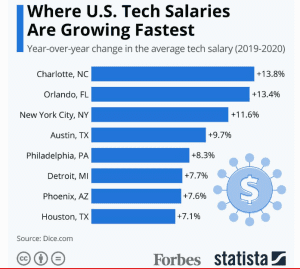Labor Market Insights
Highlights from U.S. and Mexico's labor markets, hiring landscape, and tech ecosystem
Get the latest news and highlights from Mexico and Latin America’s tech industry, insights into market trends, emerging startups, and more.

Labor Market Insights
Get the latest news and highlights from Mexico and Latin America’s tech industry, insights into market trends, emerging startups, and more.

The world of work has changed and is not looking back. This is not only true in the United States, where 58% of the working population had an opportunity to work from home at least one day a week, but it is true throughout the world.
Today, companies beyond the tech sector are looking into building remote tech teams to help them complete their digital transformation. This is the case around the world, including in regions like Mexico and Latin America. The LATAM region embraced remote work with a surprising intensity. All this means that the demand for tech talent continues as the market and technology itself changes.
We aim to understand this massive shift by diving into the different labor markets in the U.S. and Mexico and their changing dynamics.
July 18, 2025
11 min
Overcome productivity paranoia. Learn how to measure remote engineering teams with DORA and SPACE metrics to boost output and morale, not just track activity.
Mexico is the 2nd largest country in Latin America with 126 million people and a GDP of 1.27 trillion. The country maintains a developed industrial sector and has a high percentage of internet and smartphone use. Towards the end of 2022, the Mexican economy grew 4.3% year over year, showing that Mexico was lifting itself out of some of its pandemic woes. Despite challenges with inflation, projections of continued manufacturing activity and foreign investment continue as nearshoring gains popularity.
Every year, about 130,000 graduates leave university with training in software development and engineering. These numbers have been consistent for more than a decade. Ten years ago this meant that Mexico produced graduates in technology and engineering at similar rates than the United States. At the same time, thanks to relations between Mexico and the United States, various training and educational initiatives are also in place to provide Mexican students opportunities to study technology-related fields in the United States and return to their country with advanced technical skills. These initiative began all the way back in 2006 when TechBA selected 50 Mexican students to travel and train in Silicon Valley.
With those types of initiatives Mexico continued its investment in tech education and has fostered a robust ecosystem that has been home to an increasing number of local startups, VC investments, and satellite centers for U.S. companies such as Google, Pinterest, and Amazon.
Want Deeper Insights Into the Mexico IT Industry?
The report is compiled from thousands of respondents in Mexico's tech industry. We dive into questions such as: the top technologies and tech skills in the region, average salaries by state, talent retention statistics, and more.
Similar to the United States, Mexico salaries and cost of living vary by region. The country is divided into the northwest, northeast, western, southeast, and central regions. Each region key cities that have gained reputations as tech hubs or active tech ecosystems.
Cost of Living in Mexico: A Matter of Diversity
The cost of living can vary significantly in some of these regions and have a considerable effect on the expected salaries of workers that live there. The Southeast Region, for example, known as the home of Chichen Itza and other popular destinations like Cancun, has an average salary of $4,212 compared to Tijuana in the Northwest region that has an expected average salary of $2,866.
Mexico City has a reputation for being the business district of Mexico, and is therefore a sought-after destination to open up satellite offices. Guadalajara, Jalisco is known as Mexico’s Silicon Valley and has made quite the reputation for itself as an active tech ecosystem with startup and entrepreneurial activity. It has a high concentration of remote talent. Other notable cities include Monterrey, Tijuana, and Merida.

The U.S. labor market has seen its fair share of fluctuations in the last few years. Covid threw a wrench into the way people work and changed everything: from the way people think about work to the kind of work people choose to do.
The tech industry was in a unique position when covid hit and the demand for digital services skyrocketed. Throughout 2021 and 2022, the U.S. experienced what was often referred to as the tech talent shortage. In early 2020, companies were already detecting talent gaps and a low supply of workers with specialized technology skills. Forty four percent of respondents in a 2020 McKinsey survey predicted their organizations would face a skills gap within the next five years and another 43 percent had a current skills shortage. These gaps existed in data analytics, IT, mobile, and web design.
Those projections proved true as 2021 and 2022 swept in and accelerated the demand for digital transformation and technology solutions.

July 18, 2025
11 min
Overcome productivity paranoia. Learn how to measure remote engineering teams with DORA and SPACE metrics to boost output and morale, not just track activity.
The high demand for tech professionals drove the salaries for qualified workers into the six figure range. In 2021, the U.S. Tech Salaries averaged above six figures. Rapidly increasing salaries include positions like web developers, database administrators, technical support engineers, and data analysts.
Tech salaries vary by region in the United States as well. Salaries in the San Francisco Bay area are still the top salaries in the industry with an average local salary of $174,063. The average salary in New York is $161,128 and Austin not far behind with $157,612.
According to Statista, there are other emerging tech hubs such as Charlotte, North Carolina, Orlando, Florida, and others which saw an increase in salaries. From 2019 to 2020, these areas saw the fastest growth.

Schedule a conversation with one of our team members and learn more about CodersLink 25,000+ network of qualified tech talent.